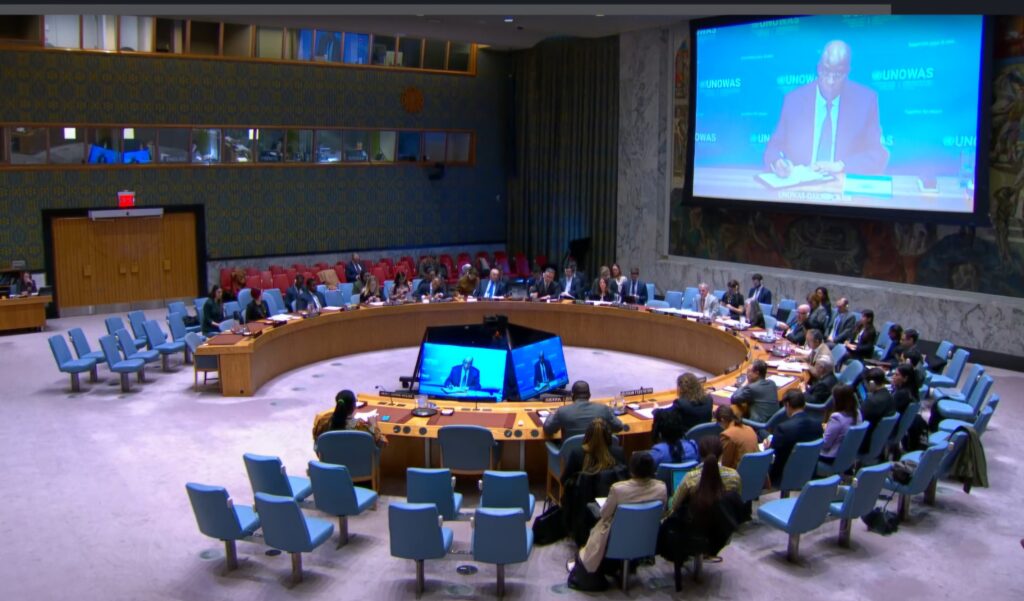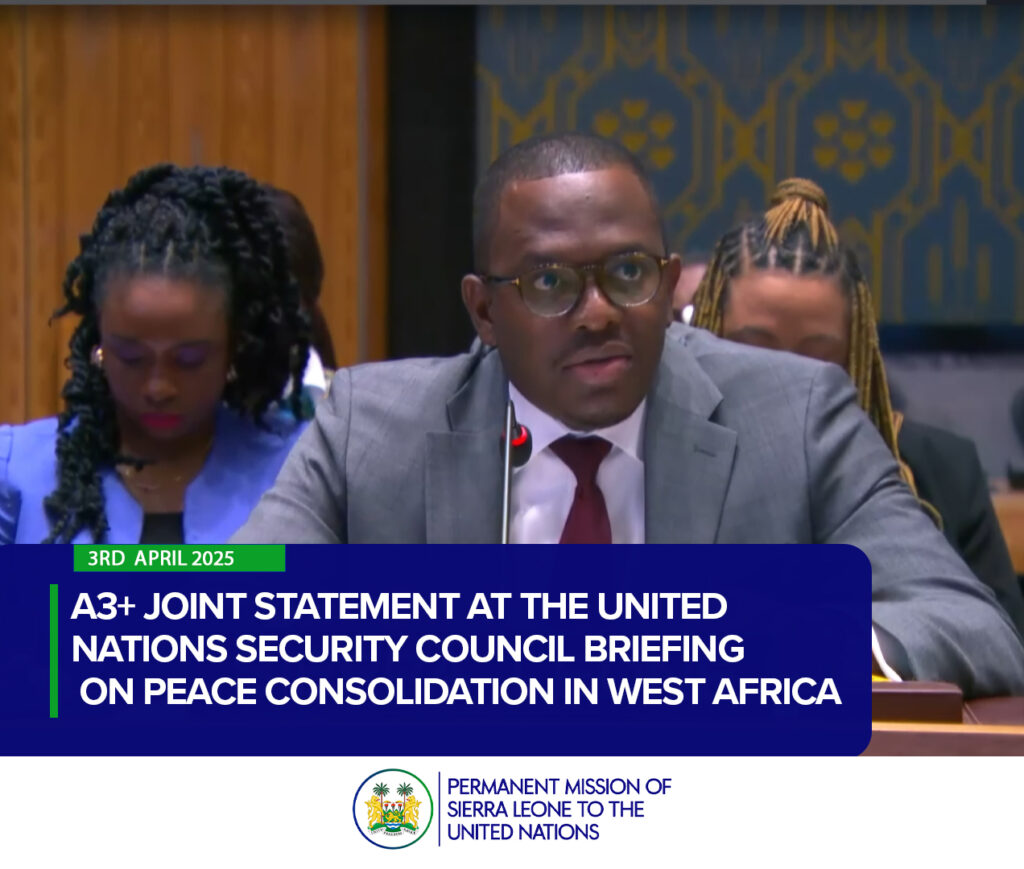DELIVERED BY
H.E. DR. MICHAEL IMRAN KANU
AMBASSADOR & PERMANENT REPRESENTATIVE
Mr. President,
I have the honour to deliver this statement on behalf of the A3+ members, Algeria, Guyana, Somalia, and my own country, Sierra Leone.
We thank Mr. Leonardo Santos Simão, Special Representative of the Secretary-General and Head of the United Nations Office for West Africa and the Sahel, for his comprehensive and valuable briefing.
We also take note of the contribution of Ms. Abiola Akiyode-Afolabi, Founding Director of Women Advocates Research and Documentation Center.
The A3+ takes note of the Report of the Secretary-General on the activities of the United Nations Office for West Africa and the Sahel (UNOWAS).
The States of West Africa and the Sahel continue to demonstrate a resolute determination to improve the well-being of their citizens by addressing security challenges, strengthening democratic governance, and advancing socioeconomic development. Allow me to highlight three key points on how the Security Council and the wider international system can support and enhance peace and stability in the region.
First, we must leverage the comparative advantage of regional security initiatives. The A3+ remains gravely concerned by the rising number and intensity of attacks perpetrated by terrorist groups, which have resulted in increasing fatalities and destabilization. The threat of these attacks spreading to West Arican coastal states is particularly alarming.
We commend the Security Council for its swift and unified response in condemning the recent attacks in Benin, Burkina Faso, Mali, and most recently, Niger. We extend our condolences to the victims of these heinous acts and reaffirm the need for continued Council unity in addressing terrorism in all its forms.
The evolving security landscape has been marked by growing geopolitical tensions. In this context, the focus must remain on strengthening regional security mechanisms, grounded in national ownership and based on cooperation among ECOWAS, the African Union, as well as neighboring countries and other sub-regional initiatives. The region’s stability must reflect collaborative approaches aligned with the priorities of its peoples.
We commend the efforts of States in the region that pursue coordinated and collaborative counterterrorism strategies. While security operations are vital, long-term stability requires addressing the root causes of extremism, including socioeconomic disparities, weak governance, and local grievances.
Accordingly, we advocate for a comprehensive regional strategy that enhances cross-border cooperation, intelligence-sharing, including with neighboring countries, and the operational effectiveness of frameworks such as the Multinational Joint Task Force (MNJTF) and the Accra Initiative. We reiterate our call for increased financial and technical support to bolster the capacities of States, particularly at joint border control points. Strengthening national and cross-border efforts across West Africa and the Sahel, remains essential to regional and global security.
Second, fostering political stability is key to durable peace. We welcome the political stability in the region, while recognizing that States continue to grapple with transitions and institutional reform processes aimed at promoting governance systems that respond effectively to geopolitical and socio-economic challenges.
We commend SRSG Simão for his proactive use of good offices to facilitate dialogue, including with ECOWAS, and in the context of national elections. Such efforts promote inclusivity, reconciliation, and national ownership, all fundamental for sustainable peace. We further applaud the African Union’s continued efforts in promoting peace, security, and development.
The A3+ welcomes ECOWAS’s strategic approach in addressing the withdrawal of AES countries and acknowledges the facilitative roles played by Senegal and Togo. We also commend the constructive and pragmatic approaches adopted by Ghana and other ECOWAS member States through bilateral engagements. We encourage sustained efforts toward a cooperative understanding to manage shared challenges and geographical realities.
We are pleased with the momentum of national dialogue processes, including the involvement of religious leaders to advance cohesion. We commend Ghana on its peaceful elections and the initiation of a constitutional review process. We further recognize the steps taken by various countries to facilitate peaceful transitions and urge the timely implementation of national roadmaps toward constitutional order.
In this vein, the A3+ reiterates its call for all States to continue to uphold the rule of law, adhere to inclusive governance processes, and ensure full respect for human rights. We underscore the pivotal role of civil society in strengthening democratic norms and reiterate the call for the immediate release of individuals arbitrarily detained.
Third, integrating responses to threat multipliers is critical to sustaining peace. The A3+ emphasizes the need for a comprehensive and preventive approach to conflict in the region, one that addresses underlying drivers such as poverty, climate change, food and water insecurity, and systemic economic inequalities. These factors not only hinder development but intensify social tensions and increase the likelihood of violent conflict.
The situation in the Sahel remains dire, especially for the millions of forcibly displaced persons. We renew our call on international partners, including international financial institutions, to scale up humanitarian assistance to meet the needs of internally displaced persons and refugees throughout the region.
Access to essential services, such as food production, education, and healthcare, remains constrained. These services are vital for building the region’s future. We take note of efforts by UNOWAS to advance the United Nations Integrated Strategy for the Sahel (UNISS) and call for renewed support toward its full operationalization. Building political and economic resilience, especially for women and youth, who are disproportionately impacted, must remain a priority.
The A3+ calls for coherent and holistic strategies, integrating the efforts of national governments, regional bodies, international organizations, and local communities. Reforms addressing global trade and financial imbalances and building adaptive capacities at all levels are especially critical for the region’s resilience and long-term peace.
In closing, Mr. President, the A3+ commends SRSG Simão for his continued leadership, particularly the progress made on the Cameroon-Nigeria Mixed Commission, and we look forward to the successful conclusion of that component of his mandate. We reaffirm our support to SRSG Simão and to the work of UNOWAS.
We reiterate our commitment to engaging constructively with all Council members to advance peace, security, and development in West Africa and the Sahel, in a manner that upholds national sovereignty, and promotes regional cooperation and leadership.
I thank you.




